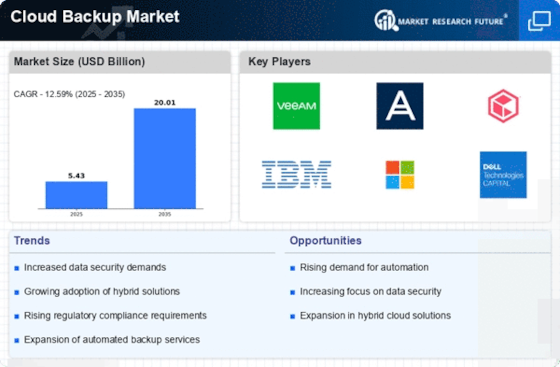Market Share
Cloud Backup Market Share Analysis
In this competitive environment, market share positioning strategies are crucial for providers in the Cloud Backup market. Differentiation is one prominent strategy, which involves providers creating differentiating features and services or making technological advances. For example, this might involve integrating advanced security techniques such as AI threat detection or deploying innovative strategies for recovering data that make them stand out from competitors. In this way, providers hope to attract businesses seeking highly customized and sophisticated capabilities in their cloud backup solutions.
A second important means in the struggle for market share is competitive pricing. Cloud backup providers tend to have pricing strategies designed for different market segments. This may involve offering multitier pricing plans based on storage space, the speed of data transfers or extra features. Among thrifty businesses, many providers attempt to win a larger share of the market with aggressive pricing. Some might try to establish themselves as "premium" providers, emphasizing quality and dependability in order to appeal specifically to enterprises capable of paying for a more advanced cloud backup solution. Ability to flexibly change pricing methods in response to market dynamics and customer requests is definitely a competitive advantage.
Strategic partnerships and alliances are also a key element in shaping market share positions within the Cloud Backup market. Backup solution vendors can extend their service offerings and client base by partnering with technology partners, software vendors or cloud infrastructure providers. These alliances can produce integrated solutions involving the marriage of backup services and complementary technologies, forming a more complete and attractive offering to customers. In particular, strategic alliances can help a provider to reach the top of its market by combining multiple parties 'strengths and capabilities. This is a strategy utilized by cloud backup providers to segment the market and develop customized solutions for them. This means understanding the special needs of different industries, large companies or small ones and adapting products to fit. For instance, one provider might offer functionality tailored to healthcare organizations for industry-specific compliance requirements or engineering solutions that are scalable but well suited for the special problems faced by SMEs.


















Leave a Comment